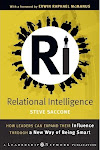When it comes to how we relate to people in a healthy or intelligent way, all of us have a blend of strengths as well as deficits. Part of the journey toward relational intelligence is identifying the deficits in how we relate to others so that we can overcome those patterns, habits, or blind spots that often hinder and short circuit our relationships (and our leadership endeavors). One window into discovering our relational deficits or "blind spots," involves looking at what we do well. Why? Because there's always a shadow side to our greatest strengths. I'm convinced that our greatest strengths can reveal more about our weaknesses that we tend to realize.
For instance, think about someone who is great at creating harmony or calming the tension that exists between two people. Despite being great at harmony and peace-making, those people tend to avoid conflict or neglect the difficult conversations they need to have.
Or in a different example, think of a leader you know who is highly catalytic and visionary. Those leaders face the great challenge of others feeling used by them to accomplish their vision or get them where they need to go.
What about a person who is highly adaptable and spontaneity is a great strength of theirs. Their temptation may be to be impulsive or have casual convictions.
There are endless examples, but it is often the shadow side of our greatest strengths that points us to potential deficits we may have in relational intelligence. Think about a few of your greatest strengths. What might be the shadow side of those strengths, and how might that affect how you do relationships?
Steve Saccone's Reflections on a New Way of Being Smart
Relational Intelligence
Create Movement. Remember to Love.

- Steve Saccone
- Los Angeles, CA, United States
- Steve is a leadership catalyst, writer, and creativity consultant. He works with Mosaic, a spiritual community in Los Angeles who strives to empower creativity of the human spirit, as well as cultivate relational and spiritual health. Steve also works as a Field Advisor for the Gallup Organization, serves as Director of Protege, a 2-year Global Leadership Program, and is an Adjunct Professor and guest lecturer for numerous universities.
Reading That's Worth Your Time
- A Whole New Mind: Why Right Brainers Will Rule the Future
- Drive: The Surprising Truth About What Motivates You
- How to Think Like Da Vinci: Seven Steps to Genius Everyday
- Lynchpin: Are You Indispensable?
- The Journey of Desire: Searching For The Life We've Only Dreamed Of
- Who's Your City? How the Creative Economy Is Making Where to Live the Most Important Decision
